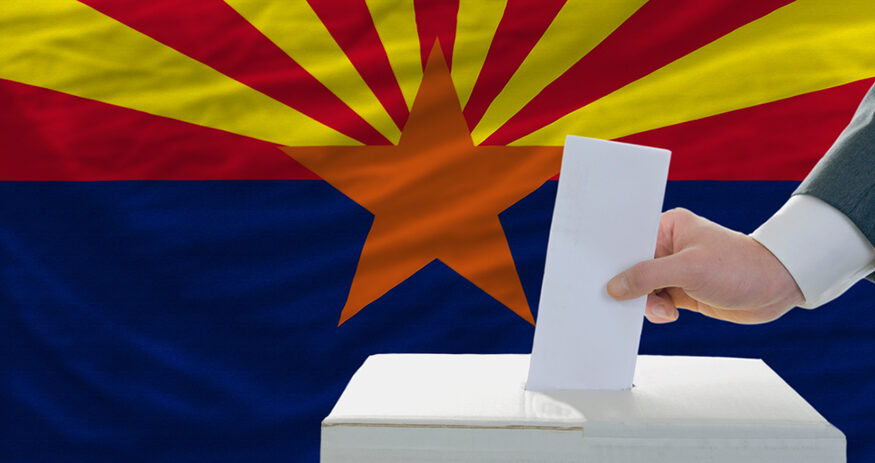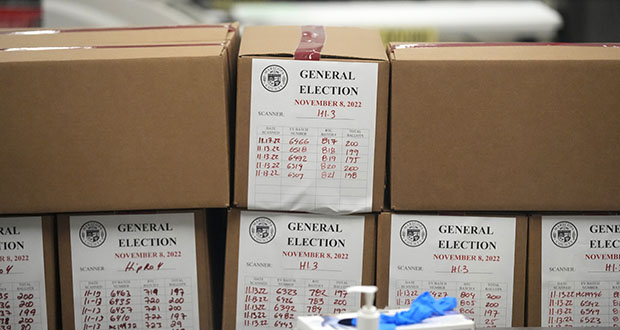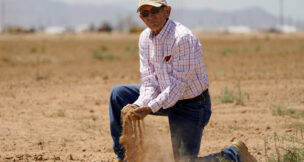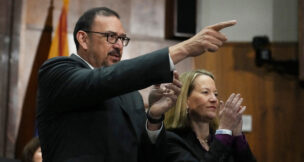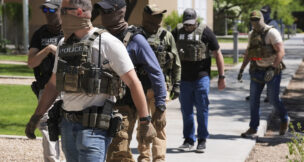Pinal County supervisor asks attorney general to investigate primary election results
Jen Fifield, Votebeat//August 9, 2024//
Pinal County supervisor asks attorney general to investigate primary election results
Jen Fifield, Votebeat//August 9, 2024//
This article was originally published by Votebeat, a nonprofit news organization covering local election administration and voting access.
A Pinal County supervisor who lost his bid for sheriff is asking the Arizona Attorney General’s Office to investigate the county’s primary election results, claiming that he has identified a suspicious pattern that signals they are inaccurate.
The candidate, Republican Kevin Cavanaugh, provided Votebeat with his analysis and said he believes the data shows “strong evidence that cheating has occurred.”
But two independent analysts who reviewed it said it is not necessarily proof of malfeasance or error. And officials in the county, located just southeast of Maricopa County, say they are confident the election went smoothly.
A spokesperson for the Attorney General’s Office confirmed that it received a complaint from Cavanaugh, but said the office could not confirm whether they will investigate.
Cavanaugh said he will raise concerns about the results when the supervisors meet Monday to certify the election results.
Voting differed from the usual pattern, supervisor says
The pattern Cavanaugh says he identified concerns the similarities between the results from early ballots and election day ballots, in at least a handful of local races. Typically, there’s a difference between the way these two groups of voters vote: In recent elections, for example, Arizona Republicans have been more likely than Democrats to vote in person on the day of the election. Cavanaugh said that in the local races he looked at, the results were nearly identical between the two groups, which he claims is a sign that something went wrong.
But two Arizona election data analysts who reviewed Cavanaugh’s analysis at Votebeat’s request — Benny White, a Republican, and Sam Almy, a Democrat — say that the voting patterns he appears to have identified do not necessarily signal fraud or mistakes. Many factors contribute to how and why voters vote, they said, and voter behavior has been increasingly unpredictable in recent elections.
“It’s a curious matter, sure, and it’s historically very interesting” that this pattern defies other recent voting patterns, White said. “But to me, that’s all it is — it’s just a curiosity.”
County Attorney Kent Volkmer, also a Republican, said he agrees with Cavanaugh that the pattern is strange. But Volkmer also said that after checking with election officials about how they conducted the election and the checks and balances that were in place, he is confident in the results.
“They were able to explain, certainly to my satisfaction, that there was nothing untoward, there is nothing hanky, there is nothing suspicious about this election,” Volkmer said.
Recorder Dana Lewis, a Republican who runs the county’s elections, said she, too, is confident the results are accurate for many reasons, including that the testing done before and after the election, as well as a hand-count audit her office completed, show the machines were programmed to work accurately. She also cited confirmation from observers from all major political parties that everything went well.
She said she and her team “will not be distracted by efforts of those who trade in the well-worn and ridiculous narrative that election staff are somehow influencing the outcome of a race in a facility built for transparency and staff dedicated to the accuracy of the outcomes.”
County attorney sees benefit of expanded hand count
Lewis said this election in the county went much better than the county’s midterm elections, further buoying her confidence in the results.
In November 2022, the county failed to initially count hundreds of votes after workers made several mistakes while tabulating ballots. A statewide recount caught the problems, and the final results were updated. The county has since moved into a new building, developed new processes to stay more organized, and hired new people.
Cavanaugh has long been a critic of the county’s elections department, and Lewis. He filed a notice in court earlier this year, for example, saying he was preparing to sue Lewis for defamation and claiming the county hadn’t properly looked into whistleblower claims. The county attorney later said he found the whistleblower’s claims meritless.
The Cavanaugh team’s analysis of the latest results show that in the races for county sheriff, attorney, assessor, and two supervisor districts, the election day and early votes for those candidates lined up within 1 percentage point of each other. In his race, for example, he got 31.0% of early votes and 30.1% of election day votes.
He called this “strange” considering that when he looked at past primary election results in these races, there was often a larger difference between a candidate’s share of the early vote and election day vote.
Volkmer said that he noticed this pattern as the results in his race were coming in, and they surprised him, too. He lost his primary election to an ally of Cavanaugh’s, Brad Miller.
“It never changed from initial drop, earlies, to late earlies,” Volkmer said. “I was surprised personally that I didn’t make up ground.”
Still, Volkmer said he and his campaign team accepted the results, and thought the pattern might have to do with the low turnout in the election.
Cavanaugh said he is interested in asking a court to order an expanded hand count of these specific races — but not before the supervisors certify the results on Monday.
Arizona law requires a hand-count audit of a select number of ballots after each election. But that law prescribes the counting of only certain races and only a certain number or percentage of ballots. The Arizona Court of Appeals ruled in October that counties cannot expand their hand-count audit in a way that isn’t outlined in state law.
Volkmer said he believes that an expanded hand count could improve voter confidence in the results.
Democratic Chair Lisa Sanor, who observed the machine testing and vote counting on the night of the election, said she was confident in the results and saw nothing suspicious that night.
But after talking to Cavanaugh, she said she agrees that a hand count of the races he identified would put the issue to rest.
“For transparency reasons, right?” she said. “To squish it.”
Checks and balances include testing and live cameras
Lewis said she was disappointed and frustrated by Cavanaugh’s claims. She said both the county’s and the secretary of state’s logic and accuracy tests on the machines showed they were working 100% accurately.
The county tabulates ballots with machines that are not connected to the internet, under 24-hour security cameras that are live streamed on the county’s website. There are strict rules on who can go in and out of the tabulation room, and political party observers are present at all times.
Almy and White cautioned against drawing conclusions based on one pattern in one set of data. Other data, such as the cast-vote record, White said, could help explain the unusual pattern. But Arizona counties do not currently provide access to that database.
Plus, Almy said, the difference in votes that sometimes emerges between early voting and election day voting is more common in high-profile and statewide races. In local races with low turnout, he said, voter behavior can be explained more by looking at the particular candidates and campaigns.
“A lot of this has to do with where they are (located) on the ballot,” Almy said.
And while these kinds of trends might once have been more predictable, since 2020, misinformation about the insecurity of voting by mail along with COVID-19 threw off voting patterns in major statewide elections, White and Almy both noted.
“It’s easy to look at one set of figures, and jump to conclusions,” White said. “But that’s not necessarily the whole story.”
Jen Fifield is a reporter for Votebeat based in Arizona. Contact Jen at jfifield@votebeat.org.

